牛津译林版必修第三册Unit 3 The world online Grammar and usage课件(共39张PPT)
文档属性
| 名称 | 牛津译林版必修第三册Unit 3 The world online Grammar and usage课件(共39张PPT) |  | |
| 格式 | ppt | ||
| 文件大小 | 1.7MB | ||
| 资源类型 | 教案 | ||
| 版本资源 | 牛津译林版(2019) | ||
| 科目 | 英语 | ||
| 更新时间 | 2023-03-19 21:57:06 | ||
图片预览


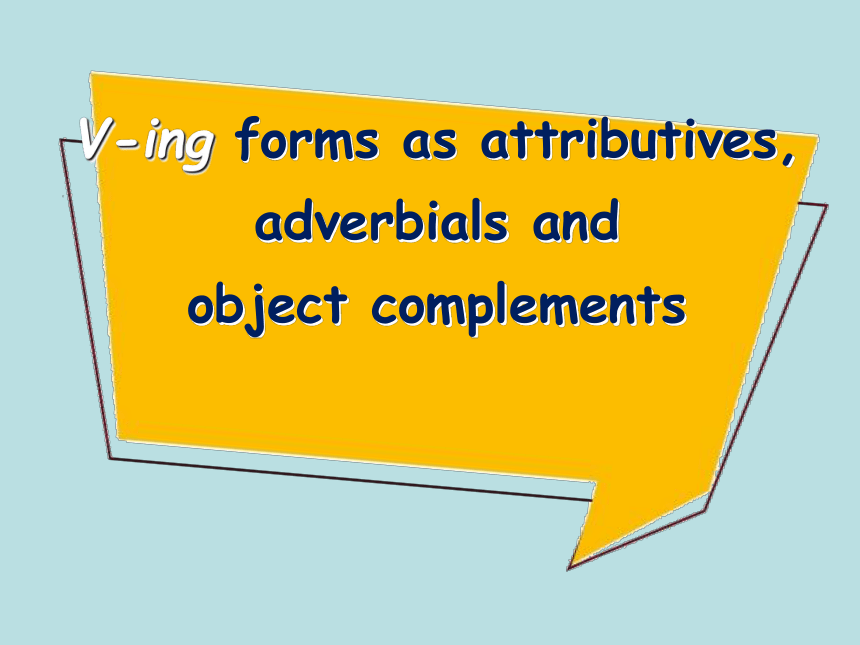
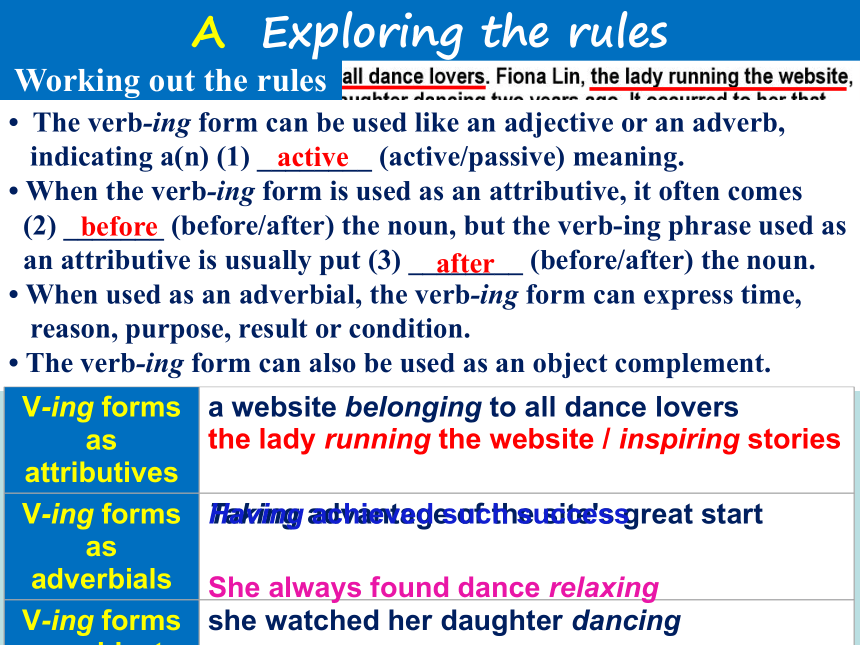

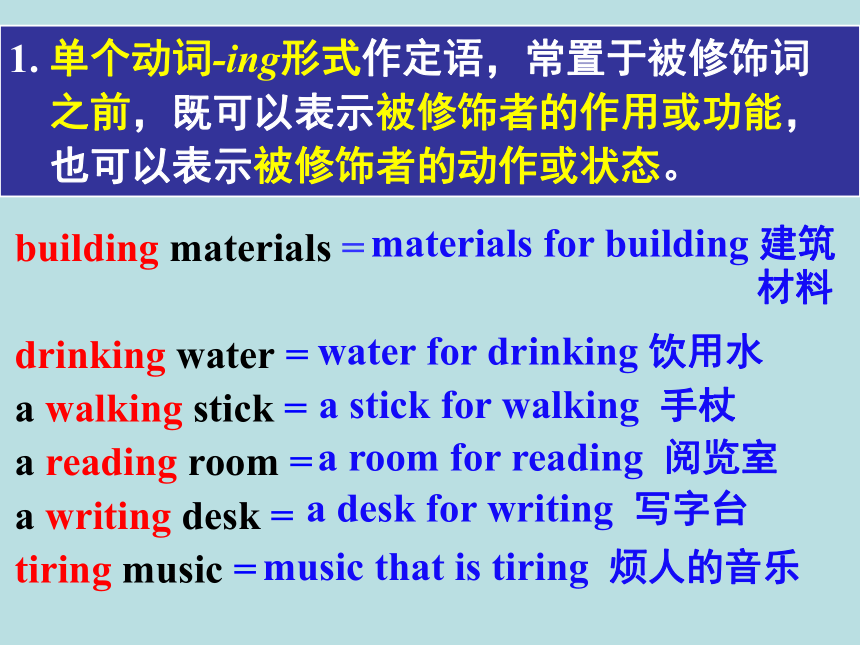
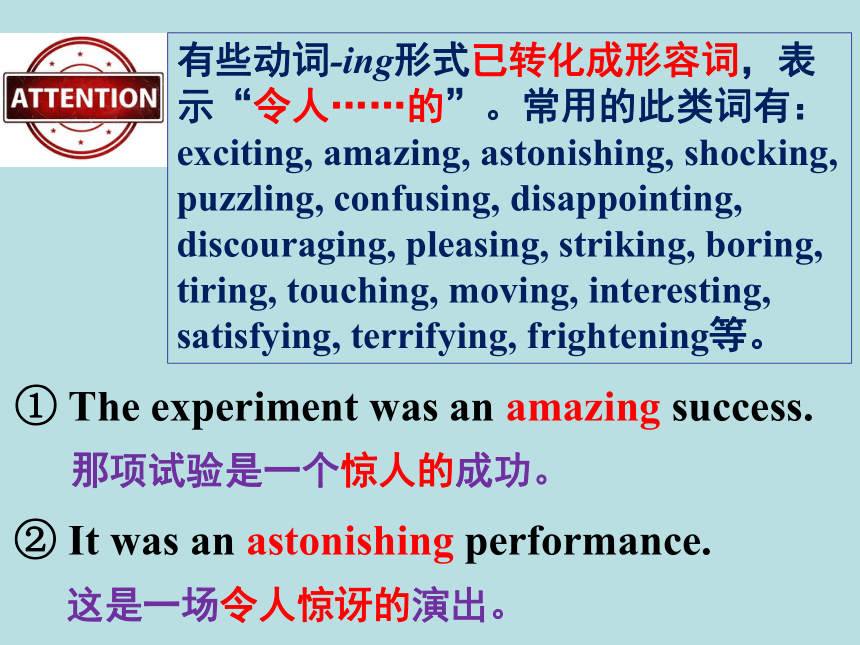
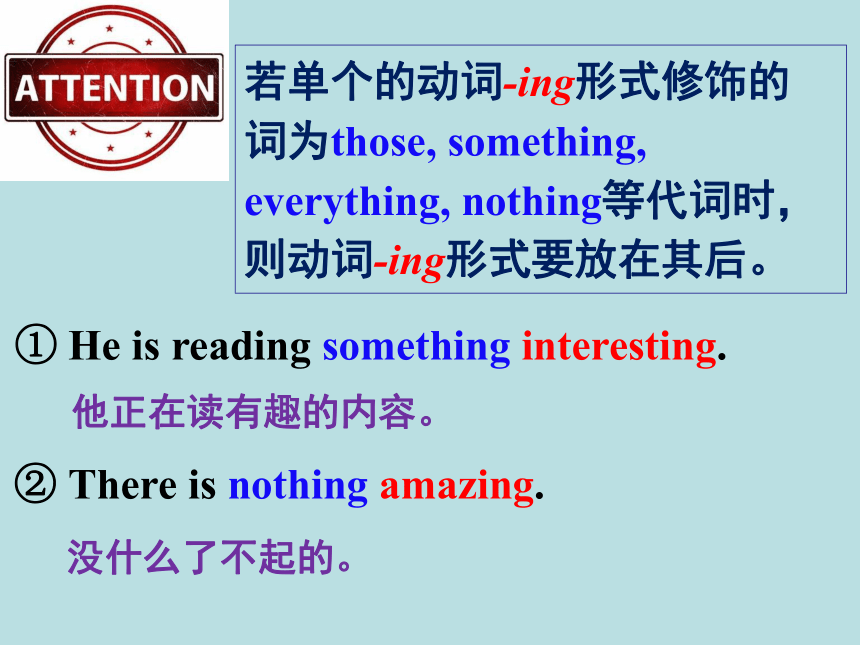
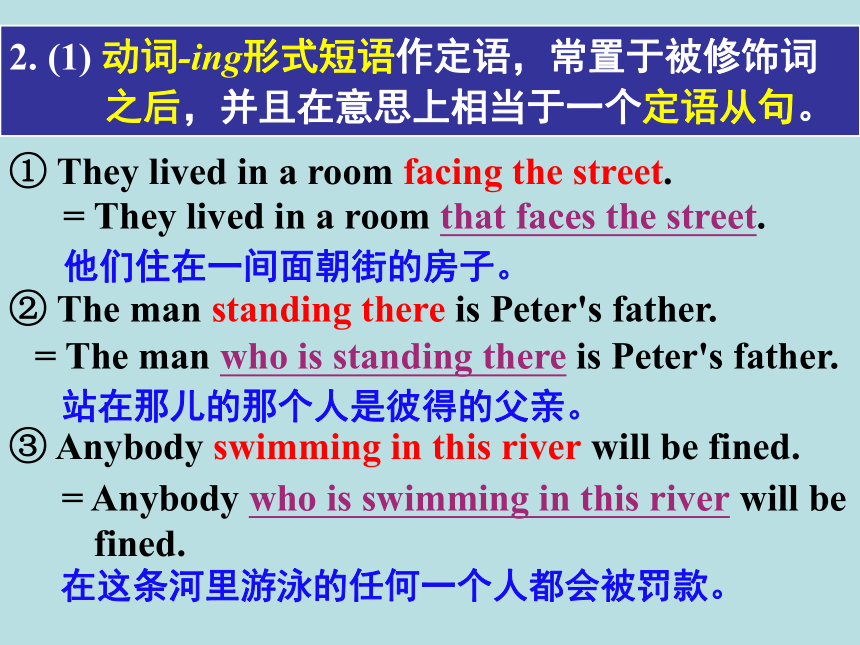
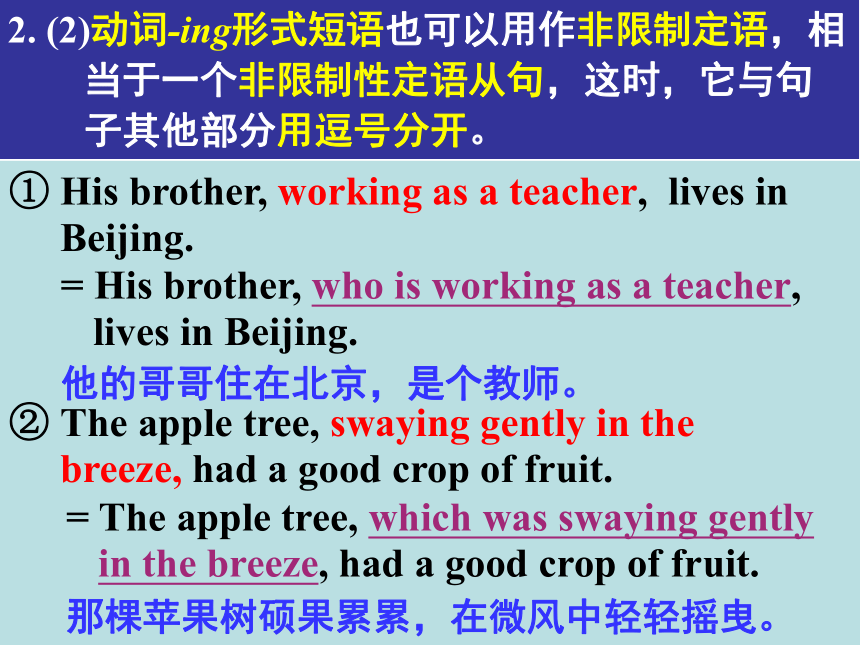
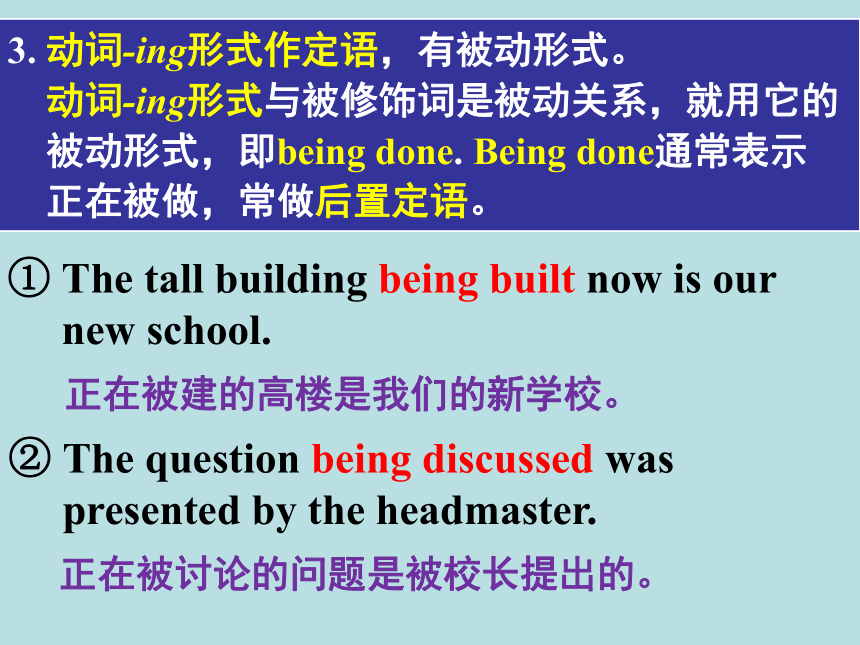
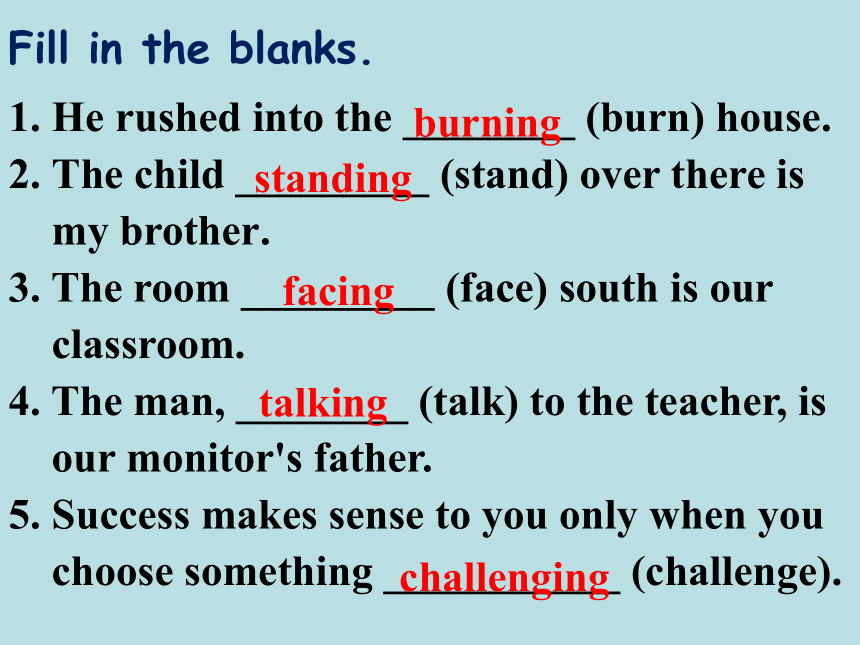
文档简介
(共39张PPT)
belong to
ballet
set up
request
technical
upload
download
属于,归……所有
n. 芭蕾舞;芭蕾舞剧;芭蕾舞团
创建,建立
vt. 要求,请求
n. 要求,请求;要求的事
adj. 技术的,技能的;
专门技术的;专业的
vt. 上载,上传
vt. 下载
Read after the tape and speak out the Chinese immediately.
Unit 3
The world online
P3
Grammar and usage
V-ing forms as attributives,
adverbials and
object complements
Anna is reading an article about a website. Find the
verb-ing forms in the article and fill in the table below.
The first ones have been done for you.
A Exploring the rules
V-ing forms as attributives a website belonging to all dance lovers
V-ing forms as adverbials Taking advantage of the site's great start
V-ing forms as object complements she watched her daughter dancing
the lady running the website / inspiring stories
She always found dance relaxing
Having achieved such success
Working out the rules
The verb-ing form can be used like an adjective or an adverb,
indicating a(n) (1) ________ (active/passive) meaning.
When the verb-ing form is used as an attributive, it often comes
(2) _______ (before/after) the noun, but the verb-ing phrase used as
an attributive is usually put (3) ________ (before/after) the noun.
When used as an adverbial, the verb-ing form can express time,
reason, purpose, result or condition.
The verb-ing form can also be used as an object complement.
active
before
after
Focus on
基本用法
V–ing forms as attributives
building materials =
drinking water =
a walking stick =
a reading room =
a writing desk =
tiring music =
materials for building 建筑
材料
water for drinking 饮用水
a stick for walking 手杖
a room for reading 阅览室
a desk for writing 写字台
music that is tiring 烦人的音乐
1. 单个动词-ing形式作定语,常置于被修饰词
之前,既可以表示被修饰者的作用或功能,
也可以表示被修饰者的动作或状态。
① The experiment was an amazing success.
② It was an astonishing performance.
那项试验是一个惊人的成功。
这是一场令人惊讶的演出。
有些动词-ing形式已转化成形容词,表示“令人……的”。常用的此类词有:exciting, amazing, astonishing, shocking, puzzling, confusing, disappointing, discouraging, pleasing, striking, boring, tiring, touching, moving, interesting, satisfying, terrifying, frightening等。
① He is reading something interesting.
② There is nothing amazing.
他正在读有趣的内容。
没什么了不起的。
若单个的动词-ing形式修饰的
词为those, something, everything, nothing等代词时,则动词-ing形式要放在其后。
① They lived in a room facing the street.
② The man standing there is Peter's father.
③ Anybody swimming in this river will be fined.
= They lived in a room that faces the street.
他们住在一间面朝街的房子。
= The man who is standing there is Peter's father.
站在那儿的那个人是彼得的父亲。
= Anybody who is swimming in this river will be fined.
在这条河里游泳的任何一个人都会被罚款。
2. (1) 动词-ing形式短语作定语,常置于被修饰词
之后,并且在意思上相当于一个定语从句。
① His brother, working as a teacher, lives in
Beijing.
② The apple tree, swaying gently in the
breeze, had a good crop of fruit.
= His brother, who is working as a teacher, lives in Beijing.
他的哥哥住在北京,是个教师。
= The apple tree, which was swaying gently in the breeze, had a good crop of fruit.
那棵苹果树硕果累累,在微风中轻轻摇曳。
2. (2)动词-ing形式短语也可以用作非限制定语,相
当于一个非限制性定语从句,这时,它与句
子其他部分用逗号分开。
3. 动词-ing形式作定语,有被动形式。
动词-ing形式与被修饰词是被动关系,就用它的
被动形式,即being done. Being done通常表示
正在被做,常做后置定语。
① The tall building being built now is our
new school.
② The question being discussed was
presented by the headmaster.
正在被建的高楼是我们的新学校。
正在被讨论的问题是被校长提出的。
Fill in the blanks.
1. He rushed into the ________ (burn) house.
2. The child _________ (stand) over there is
my brother.
3. The room _________ (face) south is our
classroom.
4. The man, ________ (talk) to the teacher, is
our monitor's father.
5. Success makes sense to you only when you
choose something ___________ (challenge).
burning
challenging
standing
facing
talking
Focus on
基本用法
V–ing forms as adverbials
1. Walking in the street, I saw a tailor's shop.
2. Being poor, he couldn't afford a TV set.
3. His father died, leaving the family even worse off.
4. Using your head, you will find a good way.
5. Studying hard, he didn't pass the exam.
6. He earns a living driving a truck.
7. He sat in the chair reading a newspaper.
时间
原因
结果
条件
让步
方式
伴随
1. When I walked in the street, I saw a tailor's shop.
2. Because he was poor, he couldn't afford a TV set.
3. His father died and left the family even worse off.
5. Though he studied hard, he didn't pass the exam.
4. If you use your head, you will find a good way.
7. He sat in the chair and read a newspaper.
6. He earns a living by driving a truck.
动词-ing形式可以表示时间、原因、结
果、条件、让步、方式或伴随状况等,其
作用相当于状语从句或并列句。
动词-ing形式用作状语时,其
逻辑主语与句子主语一致。
Check the sentences.
Being tired, I asked John to have a rest.
Being tired, John had a rest.
1. Supposing it rains, we will put off the
sports meeting.
2. Generally speaking, boys are more
interested in science than girls.
如果下雨,我们就推迟运动会。
一般来说,男孩比女孩对科学更感兴趣。
动词-ing用于某些固定搭配中,
表示说话人的态度、观点等,如:generally speaking, frankly/honestly speaking, judging by/from, considering/seeing, supposing等等
1. ____________ (not know) his address, I
couldn't go to see him yesterday.
2. They are visitors _______ (come) from
several countries.
3. _____________________ (not invite) to
the party, Mary was greatly hurt.
4. He dived into the water, _______ (leave)
only his face exposed(暴露).
5. _______ (take) a deep breath, they dived
into the water.
Not knowing
coming
Not having been invited
Fill in the blanks.
leaving
Taking
Focus on
基本用法
V–ing forms as object
complements
1. I found a bag lying on the ground.
2. When we returned to the school, we found a
stranger standing at the entrance.
3. Along the way, we saw many people playing
music, singing, and dancing.
4. She heard someone knocking at the door.
1. 动词-ing形式作宾语补足语常放在宾语后
面,表示一个正在进行的主动性的动作,
强调一个过程或一种状态。
1. They found a dog sleeping on the street.
2. They heard him singing in next room.
3. We mustn't keep them waiting.
2. 当主句转换为被动结构时,原来作宾语补
足语的动词-ing形式便转换为主语补足语。
= The dog is found sleeping on the street.
他们发现一只狗在街上睡觉。
= He was heard singing in the next room.
有人听到他在隔壁房间唱歌。
= They mustn't be kept waiting.
千万不能让他们等。
3. 能用动词-ing形式作宾语补足语的几类动词:
1. We saw a light burning in the window.
2. I felt somebody patting me on the
shoulder.
3. Can you smell anything burning
4. As he spoke, he observed everybody
looking at him curiously.
5. Listen to the birds singing.
6. I didn't notice him waiting.
① 表示感观和心理状态的动词,常见的有
watch, see, hear, feel, find, notice, smell,
observe, look at, listen to等。
1. I won't have you doing that.
2. The teacher's words set me thinking.
3. I'm sorry to have kept you waiting.
4. I can't get the clock going again.
5. You won't catch me doing that again.
6. He walked off and left me sitting there
alone.
② 表示指使意义的动词,常见的有
have, keep, set, get, catch, leave等。
4. see, hear, feel, watch等动词之后用动词-ing形式
和动词不定式作宾语补足语的区别:
1. We passed by the classroom and saw the
teacher making the experiment.
2. We sat an hour and watched the teacher
make the experiment.
我们走过教室,看见老师在做实验。
我们坐了一个小时,看老师做实验。
(只在走过教室的刹那间,看见老师正在做实验)
(一个小时之内一直在看老师做实验)
表示动作正在进行
表示(或强调)动作从开始到结束的全过程
1. I saw them _______ (force) the door open
with a hammer.
2. We heard them __________ (quarrel)
about money after the concert; they
looked very angry.
3. I heard him ________ (drop) lots of coins
into the collecting tin.
4. The students who are caught ________
(cheat) in the exam will be punished.
5. The teacher went away angrily, leaving
the student _________ (stand) outside.
forcing
quarreling
dropping
Fill in the blanks.
cheating
standing
1. 动词-ing形式作定语:
① 单个动词-ing形式作定语,常置于被修饰词
_______。
② 动词-ing形式短语作定语,常置于被修饰词
______,相当于一个_________,也可以用作
非限制定语,相当于一个________________。
③ 动词-ing形式作定语,有______形式。
之前
之后
定语从句
非限制性定语从句
被动
2. 动词-ing形式作状语:
动词-ing形式可用作状语,可以表示_____、
_____、_____、_____、_____、_____或
_________等,其作用相当于状语从句或
并列句。
时间
原因
结果
条件
让步
方式
伴随状况
3. 动词-ing形式作宾语补足语:
① 动词-ing形式作宾语补足语常放在_____
后面。
② 当主句转换为被动结构时,原来作宾语补
足语的动词-ing形式便转换为_________。
③ 能用动词-ing形式作宾语补足语的动词:
表示_____、_________和指使意义的。
宾语
主语补足语
感观
心理状态
B Applying the rules
B1 Rewrite the following sentences using verb-ing forms as
attributives, adverbials or object complements.
1. I saw that Jess was doing research online in the
computer room.
I saw _______________________ in the computer room.
2. Anybody who goes online should be careful about their
personal information.
____________________ should be careful about their
personal information.
3. When he heard the news, he jumped for joy.
_________________, he jumped for joy.
4. After I searched the Internet for information, I started
writing my article.
_______________________________________, I started
writing my article.
P35 B1
Jess doing research online
Anybody going online
Hearing the news
Having searched the Internet for information
B2 Anna is having a conversation with her friend Jen.
Complete the conversation with the correct forms of
the verbs in the box below.
amaze cut have run use think
Anna: Jen, I love your new haircut. It looks great!
Jen: Thanks! I chose it online. I was always worried about
picking a wrong style. That got me (1) __________-
what if someone could choose it for me
Anna: What do you mean
Jen: I found this (2) ________ app. If you upload a photo
of your face, it'll recommend a few haircuts to you.
Anna: Sounds super, but what if I don't like the
recommended haircuts
thinking
amazing
Jen: In that case, you can choose different styles from
hundreds of hairstyles and try them out. You can also
share pictures of your chosen haircuts on social
media and let your friends choose one for you!
Anna: Cool! What did the person (3) ________ your hair
think about the app
Jen: She said it would make her job easier. (4) _________
apps like this, people are more likely to find
satisfactory haircuts.
Anna: I agree. (5) ___________ a few bad haircuts myself,
I'm always a little nervous about having a new
haircut. I'll download it and get it (6) ___________.
amaze cut have run use think
cutting
Using
Having had
running
P35 B2
B3 In pairs, describe the pictures below using verb-ing
forms as attributives, adverbials or object complements.
Use the example to help you.
P35 B3
S1: The boy playing computer
games seems angry.
S2: I can see the boy playing
computer games excitedly.
S3: Not wanting to lose the game,
the boy is concentrating hard.
EXAMPLE:
S1: Watch out for those stealing personal information
online.
S2: Not keeping your bank account and password private,
you are likely to become a victim of online theft of
personal information.
S3: The Internet is far from safe, and every day the police
catch some people stealing personal information online.
注: 另附word文档,点此链接
1. And when he saw the mists rising from the
river and the soft clouds _____________
(surround) the mountain tops, he was
reduced to tears. (2020 全国Ⅲ卷)
surrounding
考察非谓语动词。句意:当他看到雾从江上升起,柔软的云围绕着山顶时,他流下了眼泪。设空处是非谓语动词作宾补,surround与宾语soft clouds之间是主动关系,要用v.-ing形式。故填surrounding.
Ⅰ.实战高考。
2. All the football players on the
playground cheered loudly, ________
(say) that I had a talent for football.
(2019全国卷I)
3. Nervously ______ (face) challenges, I
know I will whisper myself the two
simple words “Be yourself”.
(2019北京卷)
saying
facing
4. If you are a teenager _______ (live) in certain
parts of the province, you could be eligible(符合条件)
for this program, which provides eight weeks of
paid employment along with training.
(2019全国卷Ⅰ)
5. With ________ (shine) dark eyes, he seems like
the kind of kid who would enjoy public
speaking. (2019全国卷Ⅰ)
6. “After all, everyone has bad days and good
days,” he said. “Some days you need a _______
(help) hand and some days you can be the one
_______ (give) the _______ (help) hand.”
(2019浙江卷)
living
shining
helping
giving
helping
Ⅱ.用括号内所给单词的适当形式填空。
1. Do you know the girl _______ (sing) on the
stage
2. Professor Lin said, “The boy has an
_________ (amaze) ability to learn a new
language.”
3. Mr. Lee fell asleep with the lamp ________
(burn).
4. All the students said they had never
experienced such an __________ (interest)
class before.
singing
amazing
burning
interesting
5. Daniel first became interested in
mushrooms when __________ (explore)
the forest with his father.
6. Science and technology is developing very
quickly, ____________ (make) life much
easier for many people.
7. Why do you keep your son ____________
(stand) under the burning sun
8. Although __________ (work) very hard, he
couldn't make enough money to pay off his
debt.
exploring
making
standing
working
9. I could feel the wind _________ (blow) on
my face from an open window.
10. The teacher noticed a girl ________
(stand) at the door, so he stopped to ask
why she was there.
11. You may find it ___________ (surprise)
that a 7-year-old girl can speak five
foreign languages.
12. When he passed the bank, he saw a thief
_________ (steal) some money from it.
blowing
standing
surprising
stealing
1. Can you find the V-ing forms in an
article
2. Can you use V-ing forms as attributives,
adverbials and object complements correctly
3. Can you make up sentences using V-ing forms as attributives, adverbials and object complements as many
as possible
Self-evaluation
各个击破
1. Finish the exercises of
Grammar part in
Learning English.
2. Preview Integrated skills
on pages 36-38.
belong to
ballet
set up
request
technical
upload
download
属于,归……所有
n. 芭蕾舞;芭蕾舞剧;芭蕾舞团
创建,建立
vt. 要求,请求
n. 要求,请求;要求的事
adj. 技术的,技能的;
专门技术的;专业的
vt. 上载,上传
vt. 下载
Read after the tape and speak out the Chinese immediately.
Unit 3
The world online
P3
Grammar and usage
V-ing forms as attributives,
adverbials and
object complements
Anna is reading an article about a website. Find the
verb-ing forms in the article and fill in the table below.
The first ones have been done for you.
A Exploring the rules
V-ing forms as attributives a website belonging to all dance lovers
V-ing forms as adverbials Taking advantage of the site's great start
V-ing forms as object complements she watched her daughter dancing
the lady running the website / inspiring stories
She always found dance relaxing
Having achieved such success
Working out the rules
The verb-ing form can be used like an adjective or an adverb,
indicating a(n) (1) ________ (active/passive) meaning.
When the verb-ing form is used as an attributive, it often comes
(2) _______ (before/after) the noun, but the verb-ing phrase used as
an attributive is usually put (3) ________ (before/after) the noun.
When used as an adverbial, the verb-ing form can express time,
reason, purpose, result or condition.
The verb-ing form can also be used as an object complement.
active
before
after
Focus on
基本用法
V–ing forms as attributives
building materials =
drinking water =
a walking stick =
a reading room =
a writing desk =
tiring music =
materials for building 建筑
材料
water for drinking 饮用水
a stick for walking 手杖
a room for reading 阅览室
a desk for writing 写字台
music that is tiring 烦人的音乐
1. 单个动词-ing形式作定语,常置于被修饰词
之前,既可以表示被修饰者的作用或功能,
也可以表示被修饰者的动作或状态。
① The experiment was an amazing success.
② It was an astonishing performance.
那项试验是一个惊人的成功。
这是一场令人惊讶的演出。
有些动词-ing形式已转化成形容词,表示“令人……的”。常用的此类词有:exciting, amazing, astonishing, shocking, puzzling, confusing, disappointing, discouraging, pleasing, striking, boring, tiring, touching, moving, interesting, satisfying, terrifying, frightening等。
① He is reading something interesting.
② There is nothing amazing.
他正在读有趣的内容。
没什么了不起的。
若单个的动词-ing形式修饰的
词为those, something, everything, nothing等代词时,则动词-ing形式要放在其后。
① They lived in a room facing the street.
② The man standing there is Peter's father.
③ Anybody swimming in this river will be fined.
= They lived in a room that faces the street.
他们住在一间面朝街的房子。
= The man who is standing there is Peter's father.
站在那儿的那个人是彼得的父亲。
= Anybody who is swimming in this river will be fined.
在这条河里游泳的任何一个人都会被罚款。
2. (1) 动词-ing形式短语作定语,常置于被修饰词
之后,并且在意思上相当于一个定语从句。
① His brother, working as a teacher, lives in
Beijing.
② The apple tree, swaying gently in the
breeze, had a good crop of fruit.
= His brother, who is working as a teacher, lives in Beijing.
他的哥哥住在北京,是个教师。
= The apple tree, which was swaying gently in the breeze, had a good crop of fruit.
那棵苹果树硕果累累,在微风中轻轻摇曳。
2. (2)动词-ing形式短语也可以用作非限制定语,相
当于一个非限制性定语从句,这时,它与句
子其他部分用逗号分开。
3. 动词-ing形式作定语,有被动形式。
动词-ing形式与被修饰词是被动关系,就用它的
被动形式,即being done. Being done通常表示
正在被做,常做后置定语。
① The tall building being built now is our
new school.
② The question being discussed was
presented by the headmaster.
正在被建的高楼是我们的新学校。
正在被讨论的问题是被校长提出的。
Fill in the blanks.
1. He rushed into the ________ (burn) house.
2. The child _________ (stand) over there is
my brother.
3. The room _________ (face) south is our
classroom.
4. The man, ________ (talk) to the teacher, is
our monitor's father.
5. Success makes sense to you only when you
choose something ___________ (challenge).
burning
challenging
standing
facing
talking
Focus on
基本用法
V–ing forms as adverbials
1. Walking in the street, I saw a tailor's shop.
2. Being poor, he couldn't afford a TV set.
3. His father died, leaving the family even worse off.
4. Using your head, you will find a good way.
5. Studying hard, he didn't pass the exam.
6. He earns a living driving a truck.
7. He sat in the chair reading a newspaper.
时间
原因
结果
条件
让步
方式
伴随
1. When I walked in the street, I saw a tailor's shop.
2. Because he was poor, he couldn't afford a TV set.
3. His father died and left the family even worse off.
5. Though he studied hard, he didn't pass the exam.
4. If you use your head, you will find a good way.
7. He sat in the chair and read a newspaper.
6. He earns a living by driving a truck.
动词-ing形式可以表示时间、原因、结
果、条件、让步、方式或伴随状况等,其
作用相当于状语从句或并列句。
动词-ing形式用作状语时,其
逻辑主语与句子主语一致。
Check the sentences.
Being tired, I asked John to have a rest.
Being tired, John had a rest.
1. Supposing it rains, we will put off the
sports meeting.
2. Generally speaking, boys are more
interested in science than girls.
如果下雨,我们就推迟运动会。
一般来说,男孩比女孩对科学更感兴趣。
动词-ing用于某些固定搭配中,
表示说话人的态度、观点等,如:generally speaking, frankly/honestly speaking, judging by/from, considering/seeing, supposing等等
1. ____________ (not know) his address, I
couldn't go to see him yesterday.
2. They are visitors _______ (come) from
several countries.
3. _____________________ (not invite) to
the party, Mary was greatly hurt.
4. He dived into the water, _______ (leave)
only his face exposed(暴露).
5. _______ (take) a deep breath, they dived
into the water.
Not knowing
coming
Not having been invited
Fill in the blanks.
leaving
Taking
Focus on
基本用法
V–ing forms as object
complements
1. I found a bag lying on the ground.
2. When we returned to the school, we found a
stranger standing at the entrance.
3. Along the way, we saw many people playing
music, singing, and dancing.
4. She heard someone knocking at the door.
1. 动词-ing形式作宾语补足语常放在宾语后
面,表示一个正在进行的主动性的动作,
强调一个过程或一种状态。
1. They found a dog sleeping on the street.
2. They heard him singing in next room.
3. We mustn't keep them waiting.
2. 当主句转换为被动结构时,原来作宾语补
足语的动词-ing形式便转换为主语补足语。
= The dog is found sleeping on the street.
他们发现一只狗在街上睡觉。
= He was heard singing in the next room.
有人听到他在隔壁房间唱歌。
= They mustn't be kept waiting.
千万不能让他们等。
3. 能用动词-ing形式作宾语补足语的几类动词:
1. We saw a light burning in the window.
2. I felt somebody patting me on the
shoulder.
3. Can you smell anything burning
4. As he spoke, he observed everybody
looking at him curiously.
5. Listen to the birds singing.
6. I didn't notice him waiting.
① 表示感观和心理状态的动词,常见的有
watch, see, hear, feel, find, notice, smell,
observe, look at, listen to等。
1. I won't have you doing that.
2. The teacher's words set me thinking.
3. I'm sorry to have kept you waiting.
4. I can't get the clock going again.
5. You won't catch me doing that again.
6. He walked off and left me sitting there
alone.
② 表示指使意义的动词,常见的有
have, keep, set, get, catch, leave等。
4. see, hear, feel, watch等动词之后用动词-ing形式
和动词不定式作宾语补足语的区别:
1. We passed by the classroom and saw the
teacher making the experiment.
2. We sat an hour and watched the teacher
make the experiment.
我们走过教室,看见老师在做实验。
我们坐了一个小时,看老师做实验。
(只在走过教室的刹那间,看见老师正在做实验)
(一个小时之内一直在看老师做实验)
表示动作正在进行
表示(或强调)动作从开始到结束的全过程
1. I saw them _______ (force) the door open
with a hammer.
2. We heard them __________ (quarrel)
about money after the concert; they
looked very angry.
3. I heard him ________ (drop) lots of coins
into the collecting tin.
4. The students who are caught ________
(cheat) in the exam will be punished.
5. The teacher went away angrily, leaving
the student _________ (stand) outside.
forcing
quarreling
dropping
Fill in the blanks.
cheating
standing
1. 动词-ing形式作定语:
① 单个动词-ing形式作定语,常置于被修饰词
_______。
② 动词-ing形式短语作定语,常置于被修饰词
______,相当于一个_________,也可以用作
非限制定语,相当于一个________________。
③ 动词-ing形式作定语,有______形式。
之前
之后
定语从句
非限制性定语从句
被动
2. 动词-ing形式作状语:
动词-ing形式可用作状语,可以表示_____、
_____、_____、_____、_____、_____或
_________等,其作用相当于状语从句或
并列句。
时间
原因
结果
条件
让步
方式
伴随状况
3. 动词-ing形式作宾语补足语:
① 动词-ing形式作宾语补足语常放在_____
后面。
② 当主句转换为被动结构时,原来作宾语补
足语的动词-ing形式便转换为_________。
③ 能用动词-ing形式作宾语补足语的动词:
表示_____、_________和指使意义的。
宾语
主语补足语
感观
心理状态
B Applying the rules
B1 Rewrite the following sentences using verb-ing forms as
attributives, adverbials or object complements.
1. I saw that Jess was doing research online in the
computer room.
I saw _______________________ in the computer room.
2. Anybody who goes online should be careful about their
personal information.
____________________ should be careful about their
personal information.
3. When he heard the news, he jumped for joy.
_________________, he jumped for joy.
4. After I searched the Internet for information, I started
writing my article.
_______________________________________, I started
writing my article.
P35 B1
Jess doing research online
Anybody going online
Hearing the news
Having searched the Internet for information
B2 Anna is having a conversation with her friend Jen.
Complete the conversation with the correct forms of
the verbs in the box below.
amaze cut have run use think
Anna: Jen, I love your new haircut. It looks great!
Jen: Thanks! I chose it online. I was always worried about
picking a wrong style. That got me (1) __________-
what if someone could choose it for me
Anna: What do you mean
Jen: I found this (2) ________ app. If you upload a photo
of your face, it'll recommend a few haircuts to you.
Anna: Sounds super, but what if I don't like the
recommended haircuts
thinking
amazing
Jen: In that case, you can choose different styles from
hundreds of hairstyles and try them out. You can also
share pictures of your chosen haircuts on social
media and let your friends choose one for you!
Anna: Cool! What did the person (3) ________ your hair
think about the app
Jen: She said it would make her job easier. (4) _________
apps like this, people are more likely to find
satisfactory haircuts.
Anna: I agree. (5) ___________ a few bad haircuts myself,
I'm always a little nervous about having a new
haircut. I'll download it and get it (6) ___________.
amaze cut have run use think
cutting
Using
Having had
running
P35 B2
B3 In pairs, describe the pictures below using verb-ing
forms as attributives, adverbials or object complements.
Use the example to help you.
P35 B3
S1: The boy playing computer
games seems angry.
S2: I can see the boy playing
computer games excitedly.
S3: Not wanting to lose the game,
the boy is concentrating hard.
EXAMPLE:
S1: Watch out for those stealing personal information
online.
S2: Not keeping your bank account and password private,
you are likely to become a victim of online theft of
personal information.
S3: The Internet is far from safe, and every day the police
catch some people stealing personal information online.
注: 另附word文档,点此链接
1. And when he saw the mists rising from the
river and the soft clouds _____________
(surround) the mountain tops, he was
reduced to tears. (2020 全国Ⅲ卷)
surrounding
考察非谓语动词。句意:当他看到雾从江上升起,柔软的云围绕着山顶时,他流下了眼泪。设空处是非谓语动词作宾补,surround与宾语soft clouds之间是主动关系,要用v.-ing形式。故填surrounding.
Ⅰ.实战高考。
2. All the football players on the
playground cheered loudly, ________
(say) that I had a talent for football.
(2019全国卷I)
3. Nervously ______ (face) challenges, I
know I will whisper myself the two
simple words “Be yourself”.
(2019北京卷)
saying
facing
4. If you are a teenager _______ (live) in certain
parts of the province, you could be eligible(符合条件)
for this program, which provides eight weeks of
paid employment along with training.
(2019全国卷Ⅰ)
5. With ________ (shine) dark eyes, he seems like
the kind of kid who would enjoy public
speaking. (2019全国卷Ⅰ)
6. “After all, everyone has bad days and good
days,” he said. “Some days you need a _______
(help) hand and some days you can be the one
_______ (give) the _______ (help) hand.”
(2019浙江卷)
living
shining
helping
giving
helping
Ⅱ.用括号内所给单词的适当形式填空。
1. Do you know the girl _______ (sing) on the
stage
2. Professor Lin said, “The boy has an
_________ (amaze) ability to learn a new
language.”
3. Mr. Lee fell asleep with the lamp ________
(burn).
4. All the students said they had never
experienced such an __________ (interest)
class before.
singing
amazing
burning
interesting
5. Daniel first became interested in
mushrooms when __________ (explore)
the forest with his father.
6. Science and technology is developing very
quickly, ____________ (make) life much
easier for many people.
7. Why do you keep your son ____________
(stand) under the burning sun
8. Although __________ (work) very hard, he
couldn't make enough money to pay off his
debt.
exploring
making
standing
working
9. I could feel the wind _________ (blow) on
my face from an open window.
10. The teacher noticed a girl ________
(stand) at the door, so he stopped to ask
why she was there.
11. You may find it ___________ (surprise)
that a 7-year-old girl can speak five
foreign languages.
12. When he passed the bank, he saw a thief
_________ (steal) some money from it.
blowing
standing
surprising
stealing
1. Can you find the V-ing forms in an
article
2. Can you use V-ing forms as attributives,
adverbials and object complements correctly
3. Can you make up sentences using V-ing forms as attributives, adverbials and object complements as many
as possible
Self-evaluation
各个击破
1. Finish the exercises of
Grammar part in
Learning English.
2. Preview Integrated skills
on pages 36-38.
同课章节目录
- Unit 1 Nature in the balance
- Welcome to the unit
- Reading
- Grammar and usage
- Integrated skills
- Extended reading
- Project
- Unit 2 Natural disasters
- Welcome to the unit
- Reading
- Grammar and usage
- Integrated skills
- Extended reading
- Project
- Unit 3 The world online
- Welcome to the unit
- Reading
- Grammar and usage
- Integrated skills
- Extended reading
- Project
- Unit 4 Scientists who changed the world
- Welcome to the unit
- Reading
- Grammar and usage
- Integrated skills
- Extended reading
- Project
